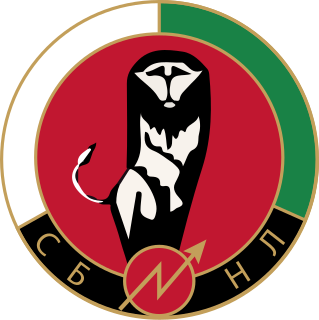
Looking Backward: 2000–1887 is a utopian science fiction novel by Edward Bellamy, a journalist and writer from Chicopee Falls, Massachusetts; it was first published in 1888.

Kamenitza is one of the top-selling Bulgarian beer companies, based in the city of Plovdiv. It was established in 1881 and is currently owned by the multinational Molson Coors. The brewery has a wide variety of lager and dark beers. Its slogan is "Mujete znayat zashto" which translates to "Men know why."

The Serbo-Bulgarian War or Serbian–Bulgarian War was a war between the Kingdom of Serbia and Principality of Bulgaria that erupted on 14 November [O.S. 2 November] 1885 and lasted until 28 November [O.S. 16 November] 1885. Serbia took the initiative in starting the war but was decisively defeated. Austria demanded Bulgaria stop its invasion, and a truce resulted. Final peace was signed on 3 March [O.S. 19 February] 1886 in Bucharest. The old boundaries were not changed. As a result of the war, European powers acknowledged the act of Unification of Bulgaria which happened on 18 September [O.S. 6 September] 1885.

Bulgaria has participated in the Eurovision Song Contest 12 times since making its debut at the 2005 contest in Kiev. The country's best result is a second-place finish for Kristian Kostov and the song "Beautiful Mess" at the 2017 contest.

The Union of Bulgarian National Legions was an ultranationalist, profascist, pro-Nazi, right extremist organization in Bulgaria, which was active between 1932 and 1944.

Montana is a city in northwestern Bulgaria, located 50 kilometres south of the Danube river, 40 kilometres northwest of Vratsa and 30 kilometres east of the Serbian border. It is the administrative centre of Montana Province.

Konstantin Stoilov was a leading Bulgarian politician and twice Prime Minister. Simeon Radev described him as the most European-like of all Bulgarian politicians.

The military history of Bulgaria during World War II encompasses an initial period of neutrality until 1 March 1941, a period of alliance with the Axis Powers until 9 September 1944 and a period of alignment with the Allies in the final year of the war. Bulgaria functioned as an authoritarian state during most of World War II. Tsar Boris III ruled with a prime minister and a parliament.

The Bacho Kiro cave is situated 5 km (3.1 mi) west of the town Dryanovo, Bulgaria, only 300 m (980 ft) away from the Dryanovo Monastery. It is embedded in the canyons of the Andaka and Dryanovo River. It was opened in 1890 and the first recreational visitors entered the cave in 1938, two years before it was renamed in honor of Bulgarian National Revival leader, teacher and revolutionary Bacho Kiro. The cave is a four-storey labyrinth of galleries and corridors with a total length of 3,600 m (11,800 ft), 700 m (2,300 ft) of which are maintained for public access and equipped with electrical lights since 1964. An underground river has over time carved out the many galleries that contain countless stalactone, stalactite, and stalagmite speleothem formations of great beauty. Galleries and caverns of a 1,200 m (3,900 ft) long section have been musingly named as a popular description of this fairy-tale underground world. The formations succession: Bacho Kiro’s Throne, The Dwarfs, The Sleeping Princess, The Throne Hall, The Reception Hall, The Haidouti Meeting-Ground, The Fountain and the Sacrificial Altar.

Kubrat is a town in Razgrad Province, Northeastern Bulgaria, part of the Ludogorie region. Named after the Bulgar ruler Kubrat, it is the administrative centre of the homonymous Kubrat Municipality. As of December 2009, the town has a population of 8,118 inhabitants.

The Bulgarian Greek Catholic Church is a Byzantine Rite sui juris particular Church in full union with the Roman Catholic Church.

The National Opera and Ballet is a national cultural institution in Bulgaria that covers opera and ballet. It is based in an imposing building in Sofia, the capital of Bulgaria.

The National Social Movement was a minor Bulgarian political party formed in 1932 by Aleksandar Tsankov.
Vasil Kanchov was a Bulgarian geographer, ethnographer and politician.
Bulgarophiles -, ; ; ; is a term used for people from region of Macedonia and region of Pomoravlje who regard themselves as Bulgarians.
Konstantin Lukash was a Bulgarian officer and Chief of Staff of the Bulgarian Army during the period 11 August 1941 - 11 May 1944.

The Liberal Party was a political party in Bulgaria and the main force in domestic politics between independence in 1878 and the mid-1880s when it dissolved into several different factions.
SS Frederica was a passenger vessel built for the London and South Western Railway in 1890. She later served in the Ottoman Navy as the minelayer Nilufer and was sunk during World War I.















